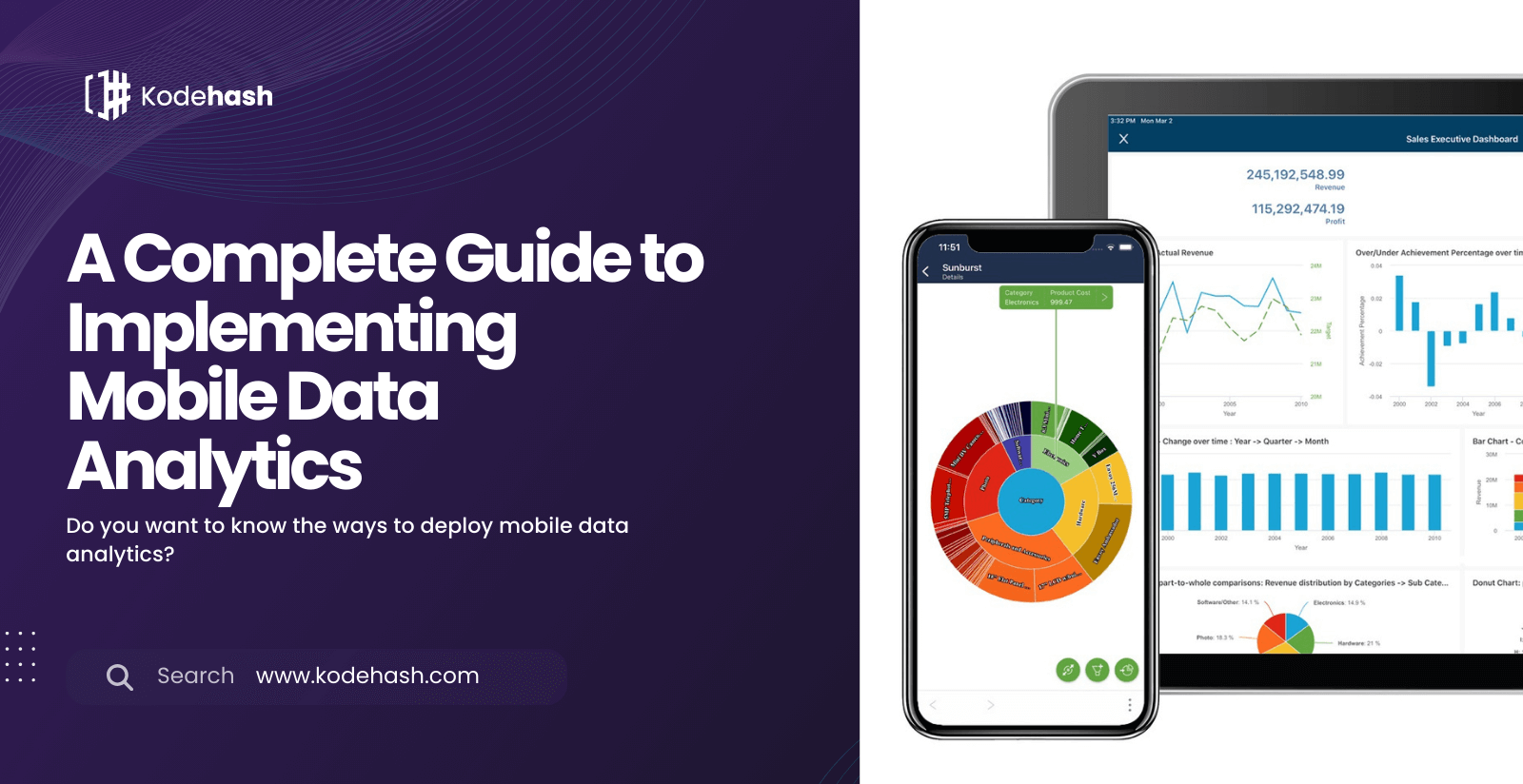A Complete Guide to Implementing Mobile Data Analytics

Mobile apps have become an important aspect of our day-to-day lives, with global users relying upon the same for doing several tasks. With expanding mobile app market size, the need for effective mobile data analytics has also increased manifolds. Mobile data analytics provide key insights into user behaviour, app performance, and latest trends. The information gathered helps businesses make accurate data-driven decisions to optimise their app, improve user experience, and enjoy a competitive edge.
In today’s guide, we’ll learn about mobile app data analytics, ways, and much more.
What is Mobile Data Analytics?
Mobile data analytics means gathering, processing, and analysing data obtained from mobile devices and applications. It consists of diversified factors including user interactions, app usage patterns, device information, and location data. Mobile data analytics is done with the vision to get key insights that helps businesses in improving app functionality, user engagement, and overall business performance.
Mobile analytics measure metrics based on which businesses can drive engagement, retention, and conversion.
- Engagement Metrics
- Downloads
- Sessions and Views
- User Retention
- Revenue Generation
- Location and Device Information
- Countries and other Location Data
- In-app purchases, etc.
By knowing how users interact with your app, you can identify areas that need improvement while offering a seamless user experience.
Why Do Companies Use Mobile Analytics?
In the present scenario, businesses offer an enriched user experience to stay competitive. With millions of apps available for download, the standard of experiences they deliver is also improving rapidly. Accordingly, users have high expectations for mobile apps and websites and if they don’t like the app, they delete them within a month.
By monitoring mobile analytics, companies can solve all the issues and improve their app’ functioning.
Various Kinds of Mobile Analytics
Mentioned below are various kinds of mobile analytics.
1. App Monetization Analytics
Almost all smartphone users prefer not to pay for an app. Since the customers love free applications, companies also offer free downloads. The companies can still earn decent revenues from in-app purchases, subscriptions, and ad revenue. App monetization analytics let organisations track metrics related to monetization strategies and optimise those strategies leading to higher revenues.
2. In-App Analytics
Everything done by the users within an application is referred to as in-app engagement analytics. It’s an ‘in-session’ analytic helpful in tracking user behaviour and interaction within the app. In-app analytics features session duration, user retention rate, screen views, feature usage, and conversion funnels. These parameters help understand the way users interact with their apps and highlight areas that require improvement. In-app analytics provide fast, actionable app optimization and user satisfaction that helps grow your business.
3. Performance Analysis
Performance analytics is another important component that tracks the overall performance of the mobile app. It tracks the loading time, app stability, crash rates, resource utilisation, and responsiveness. Also, it helps in identifying any issues or bottlenecks that could negatively impact the user experience, allowing the program to be optimised for increased reliability and performance.

What are the Advantages of Mobile Data Analytics?
Mentioned below are the benefits of mobile data analytics:
Provide Detailed Insights
Mobile data analytics provide key insights about user preferences & behaviour, and their interaction within the apps. Mobile app developers can understand the way users navigate the app, which are the most popular features, and areas that need improvements. By analysing all these aspects, one can have a user centric app.
Make Strong Decisions
Mobile data analytics provides a better understanding of things that bring improved business outcomes. Whether you are introducing a new feature, making changes in user interface, or planning a new marketing strategy, data analytics provides a solid foundation for decision-making, thereby reducing the chances of errors.
Enhanced Marketing Tactics
If you want to target the right audience, include tailored marketing strategy to boost user engagement and conversion rates. You can divide your audience as per the location, device type, in-app behavior, or purchasing history. Tailored campaigns not just boost user engagement but also improve conversion rates by delivering relevant content at the right time.
Improved Products
By using input and data analytics, businesses can create and improve better products. Data analytics helps in evaluating what’s working and what’s not, allowing you to revamp the app’s functionality accordingly. This iterative improvement process leads to better user retention and satisfaction.
Save Money
By using the combination of right tactics and features, one can save a lot of money and obtain better results. Implementing features or marketing strategies based on real-time data prevents wasted resources on ineffective features or campaigns, allowing you to allocate your budget more efficiently. This reduces unnecessary spending and increases ROI.

Stay Competitive
Mobile data analytics gives competitive edge and evolve apps with changing consumers’ demands. By leveraging mobile data analytics, one can have a competitive edge and can adapt to the latest changes. Whether it’s about focusing on the user preferences, looking for new updates, or competitive trends, it helps respond to an ever-evolving market.
Best Practices for Mobile Data Analytics
To get the most out of mobile data analytics, one must consider the following best practices:
Data Privacy
While doing data analytics, adhere to privacy laws like GDPR and CCPA. Inform the users about their data being used with an option to opt out.
Use Real-Time Analytics
Real-time data provides immediate insights that allow you to respond quickly to user behavior changes.
Track Across Multiple Channels
Users often interact with your app on different devices or platforms. Ensure your analytics cover all channels for a comprehensive view of the user journey.
Keep Reports Simple
Though data plays an important role, managing it is an overwhelming task. Thus, pay attention to the metrics that align with your business goals and make decisions based on those.
Incorporate User Feedback
Analytics is powerful, but combining it with qualitative feedback from users gives a more complete picture.
Mobile Analytics Vs Web Analytics
Both mobile and web analytics have similar goals and processes, but still differ a lot in many ways. Web analytics collect data around websites while mobile analytics focus on mobile data.
Mobile analytics track individuals’ users which is not possible in case of web analytics. By the apps installed on a mobile device, one can easily segment users and analyze how their journeys evolve.
Mobile analytics track the users’ behavior data to web analytics. The desktop users use clicks, mouse scrolls and keyboard shortcuts while navigating; while mobile users use scrolls, pinches and taps.
Mobile analytics track various KPIs and speed up the success of your app by using key metrics like downloads, feature usage, location, etc. which however, are not available in web analytics.
How Kodehash Can Help You to Deploy Mobile Data Analytics
Kodehash, a leading mobile app development company, provides complete assistance in deploying mobile data analytics for your app. Our team is highly specialized in integrating analytics SDKs, setting up data collection points, and leveraging advanced analytics tools to track user behavior effectively.
By taking our expertise, you will be able to get key insights to optimise user experience, improve apps’ performance, and drive business growth. So don’t wait further, connect with us now.
Mobile Data Analytics: FAQs
What are mobile analytics?
Mobile analytics provides information to the businesses regarding users’, track their journeys, record their behavior, and report on the app’s performance.
Why do businesses prefer using data analytics?
Data analytics help a business optimize its performance, perform more efficiently, maximize profit, or make more strategically-guided decisions.
Name the key metrics used in mobile data analytics?
A few of the metrics used in mobile data analytics include retention rate, churn rate, bounce rate, number of sessions per user, and customer satisfaction score.
Recent Blogs
Subscribe:
Subscribe for the newsletter and receive email notification of every future post.



